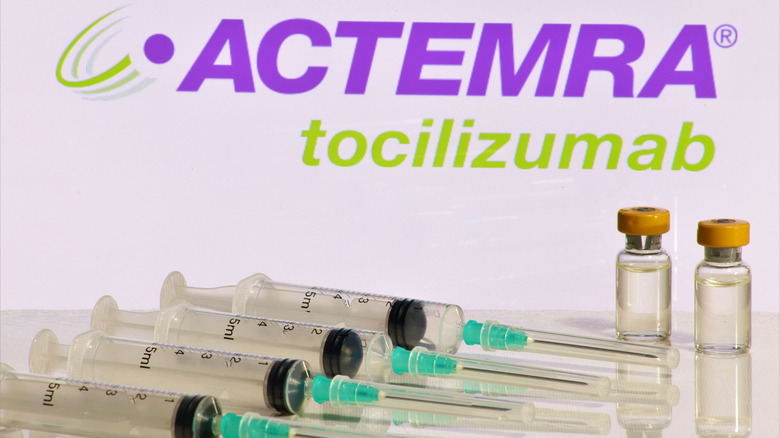The Truth About The Rheumatoid Arthritis Drug That Treats COVID-19
In June, the Food and Drug Administration authorized the use of Actemra (tocilizumab), a drug traditionally used to treat rheumatoid arthritis, for the treatment of some patients with COVID-19. Tocilizumab works by inhibiting parts of the immune system responsible for creating inflammation in the body, which is a prime factor of rheumatoid arthritis. Patients generally take tocilizumab with another medication to ease their symptoms, according to WebMD. More specifically, the medication works by blocking cellular protein receptors called cytokine, which often cause inflammation, according to Actemra.
For patients diagnosed with severe cases of COVID-19, the immune system in experiences what is called a "cytokine storm," which could potentially lead to inflammation of the lungs, causing damage (via University of California in San Diego). Tocilizumab has proven to be successful in treating these so-called storms in patients who have severe cases of pneumonia caused by COVID-19. In addition, The Lancet noted that some patients with pneumonia experience microvascular thrombosis, which increases the risk for multi-organ failure, and tocilizumab helps reduce the chances of this occurring.
Tocilizumab was issued an EUA for COVID-19 over the summer
Although Actemra (tocilizumab) is FDA-approved for treating rheumatoid arthritis, it is not FDA-approved for the treatment of COVID-19, as of this writing. However, the FDA issued an emergency use authorization for tocilizumab for patients who are hospitalized with severe COVID-19 and are also receiving some form of corticosteroid treatment. These patients also require ventilation or oxygen as part of their treatment.
Within a 28-day window, clinical trials showed that tocilizumab alongside other routine treatments led to a reduced risk of death. In a statement, the FDA said that while vaccines have proven to be successful in limiting the number of COVID-19 patients that require hospitalization, it is committed to making other treatments available for patients who do end up in the hospital.
Tocilizumab is administered intravenously, and some side effects include bowel habit changes, stomach pain, and changes in liver and blood tests, according to Johns Hopkins Medicine. Patients might also experience high blood pressure, anxiety, constipation, diarrhea, nausea, and insomnia from taking the drug (via FDA).


